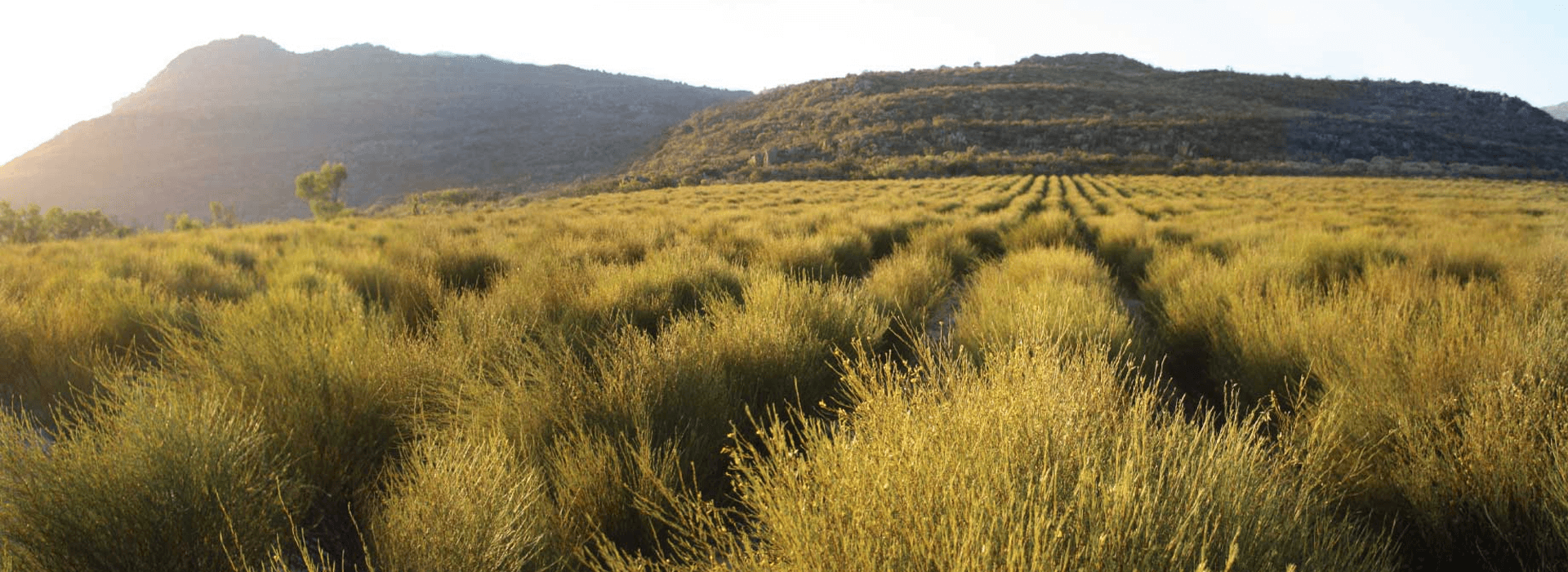About Rooibos
Rooibos, also known as Aspalathus Linearis, derives from
the Afrikaans word meaning "red bush." It is a unique,
natural herb found exclusively in South Africa. This plant
grows in the Cederberg region, about 200 kilometers north
of the Cape of Good Hope. Due to its rare seeds and the
complexity of cultivation, Rooibos is often referred to
as South Africa's national treasure tea. It is a type
of herbal beverage similar to black tea.
100% Naturally Caffeine-Free
Powerful Antioxidant
Promotes Relaxation and Sleep

Rooibos has these characteristics:
Since the 1960s, European, American and Japanese scholars have carried out a lot of scientific research into the health benefits of Rooibos.

Rooibos is a pure, natural herb, free from pesticide residues, heavy metals, or any additives.

It contains no caffeine, no calories, and very low tannins—about 10% of the tannin content found in black tea (Camellia sinensis). It is rich in flavonoids and polyphenols and does not contain components like theophylline or oxalic acid, which require metabolic breakdown by the human body.

Rooibos is packed with bioflavonoids (also known as Vita P), which help calm the central nervous system, elevate mood, and reduce feelings of depression.

The Latin name of Rooibos, Aspalathus Linearis, highlights its rich content of SOD (superoxide dismutase), hydroxy acids (AHA), and an abundance of trace minerals. These compounds support collagen and elastin synthesis, making Rooibos a popular ingredient in skincare products for moisturizing, anti-aging, and antioxidant benefits.

The primary active components of Rooibos include Aspalatin and other flavonoids and polyphenols, which help eliminate free radicals produced by human metabolism and boost immunity.
Rooibos is popular all over the world, especially in Japan, Germany, the United Kingdom and the United States.
Studies have shown that Rooibos is popular among all groups because of its caffeine-free status and proven ability to increase SOD (superoxide dismutase) activity in vivo.

GLOBAL
POPULAR



Rooibos is popular all over the world, especially in Japan, Germany, the United Kingdom and the United States.
Studies have shown that Rooibos is popular among all groups because of its caffeine-free status and proven ability to increase SOD (superoxide dismutase) activity in vivo.

Research History
1969
Dr. Annique Theron discovered some of the miraculous health benefits of Rooibos.
1988
Kazuhiro Okamura, a Japanese Doctor of Agriculture, confirmed that Rooibos has a variety of disease-preventing effects.
1990
The American medical community published a medical report on the health effects of Rooibos.
1991
Dr. Toshichi Yoshikawa of Kyoto Prefectural Medical University in Japan presented an experimental report on the removal of reactive oxygen species by Rooibos at the "Freedom Fund Society" held in France.
1992
Japanese medical doctor Niwa Ren reported that Rooibos is rich in nine flavonoids, which work better than synthetic SOD agents.
1993
Dr. Hiroshi Maeda of Kumamoto University School of Medicine in Japan proved that Rooibos lowers blood lipids, lowers cholesterol and softens blood vessels more effectively than green Camelia Sinensis.
1994
1994 - Dr. Annique Theron compiles the results of her lifelong research into Rooibos in the form of a book, Allergies – An Amazing Discovery. Highlights include the ability to mitigate various childhood discomforts such as colic and various skin conditions such as eczema.
1994
Dr. Masatoshi proved that Rooibos can aid in managing the symptoms of rheumatoid arthritis.
1994
Dr. Shimoi, Dr. Hokabe, and Dr. Sasaki of the Japanese University of Food and Nutrition published a report in 120 volumes of the World Pharmacological Literature, confirming that Rooibos can prevent cancer.
1994
Dr. Kato, Dr. Kunihiko and Dr. Nakano of the Japanese Medical College published a report in 120 volumes of medical literature, confirming that Rooibos can prevent the onset of diabetes.
1995
1995 - Dr. Ferreira, Dr. Charlene Marais, Dr. Jacobus A. Steen Kamp, Dr. Elizabeth Joubert, published a report confirming that Rooibos has the effect of preventing a variety of diseases, due to it having the following: antibacterial, antifungal, antiviral, anti-arteriosclerosis, anti-liver toxicity, antioxidant, antispasmodic, anti-ulcer and over 22 other properties.
1997
1997 - At the International Exposition of Inventions in Geneva, Dr. Annique Theron was awarded the "Gold Medal for Invention", "Gold Medal for New Technology Patent" and "Gold Medal for the Most Outstanding International Female Inventor". Based on its research results, Rooibos products are sold in more than 50 countries.
